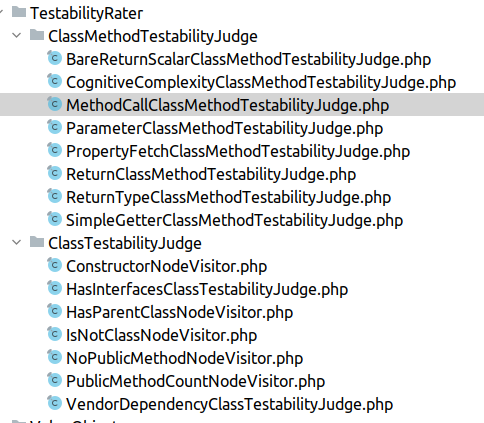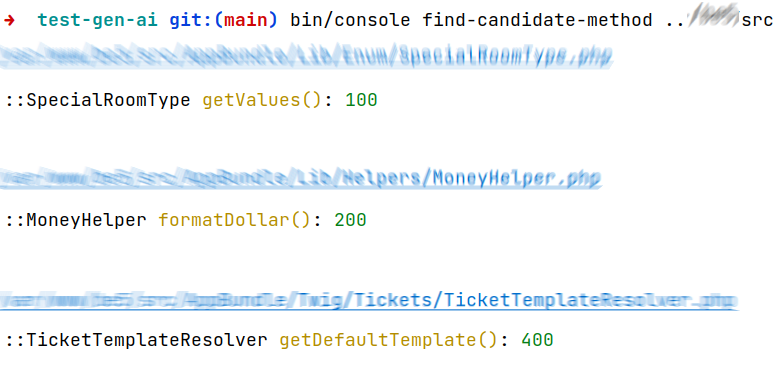How can we Generate Unit Tests - Part 1: Testability Score
As you have noticed, apart from writing micro-packages for PHPStan, my passion is exploring the field of generated unit tests. I want to share my thoughts on this topic with you to get your feedback and find a path to the best solution.
You will learn a lot about making man-like working/thinking tools.
I am still determining where this goes, but I love the journey. Let's dive in.
The Journey Begins
I went to a pub with my friend Kerrial and a month and 2 days. It was a typical evening, restaurants were full due to Christmas parties, and we had to find a place with black beer (the only beer I love). We ended up in 4th class pub with local leftovers (the higher number, the worse), which was very suspicious regarding provided services. Lucky for us, the beer was good, and the food was even better.
Maybe it was this shockingly positive mood that got us into the following chat:
- "Man, this project I upgrade has no tests. It's like a minefield. They do it manually once in a while."
- "I feel you. My project has no tests too. They make so much money it covers the regression, but it's not sustainable, and there are no changes, and it's super stressful for me."
- "There must be a way to cover those with unit tests somehow, right?"
- "Well, we could use some mix of Rector, PHPStan, and AST to create tests, right? It's just a PHP code, after all..."
Current status: in a pub for a beer with a friend.
— Tomas Votruba 🇺🇦 (@VotrubaT) December 2, 2022,
Making algorithm for generating useful unit test from existing PHP code 🤗 pic.twitter.com/HPrXwzfGwW
Since then, I have been thinking about this topic during open-source days and stuffing my belly with potato salad and chicken schnitzels. I've been hooked for a month, and experiments started to happen. Typical for me, I go almost fanatically deep into work to solve the problem or find out, but it's not possible (yet).
💡 Before we get into writing or generating tests themselves, we don't want to waste time on testing crap or burning out on fractal code tests. We have to make sure we know what to test.
Funnily enough, we'll see how raw technical thinking joins the practical philosophy of test value.
What do we Test?
We have a new project that has 300 classes and zero tests. There is 0 % test coverage. How do we decide what to test first?
The easiest item that comes to mind is a getter of scalar value, right?
public function getName(): string
{
return $this->name;
}
It's a simple method that returns a value. It's easy to test and find with raw AST traversing.
public function testGetName(): void
{
$post = new Post();
$post->setName('How to Increase Type Coverage');
$this->assertSame('How to Increase Type Coverage', $post->getName());
}
That's it! With this single pattern, we can generate tests for all the scalar getters in our project. Wow!
But wait, what is the added value of such a test? We don't want to puke out test coverage just for its sake. I don't see any value in this test, and it's a test creep. Test that technically "test something", but it's not helpful.
We have to take care of the test, maintain it and extend it if the original code changes. The test does not even test any logic; it only tests the PHP works as expected.
⚠️ So no getters and setters!
What Else do We Test?
During the discussion, we came to an idea:
"You know what could be cool? If we test the repository that fetches the talk entities with Doctrine and traverses that all relations are set properly".
Yes, that would be cool, but...
💡 We want tests that make us feel more confident when:
- we change the code manually
- we run coding standard tool
- we run Rector with automated code modification or removal
- we run composer update
- without overlapping another tool that already handled it
What does the test above actually test?
- the database connection works
- The Doctrine package works
That's not our business logic, but a 3rd party code. We would test something that's already been tested somewhere else by the packages/tool provider. If we change our business logic and it breaks, these tests will never notice it.
⚠️ So no 3rd party testing, neither external services.
3 Groups of Code Testability
After a few similar mental iterations, we end up 3 groups:
- A. what not to test because it's way too simple, boring, or impossible
- B. what not to test because it's way too complex and tests 3rd party code
- C. what is left, our business logic, exclusively our code, that spreads across middle and complex operations
To give you an idea, here are a few examples for each group:
-
A.
- getters and setters
- fetch of static property
- method without a return value
-
B.
- controller action
- code that uses 3rd party service in the constructor
- class that extends a parent class
-
C.
- a public method that computes price value
- foreach that returns value by provided key
- a concat method that joins a few arguments, a local constant, and a number and returns a string value
This is our battle plan to find the low-hanging fruit - a public method that is very simple, but there has some logic worth testing.
How do we Transfer it Into Code?
Remember, we have a new project that has 300 classes. With roughly 700-800 public methods. How do we find the ideal candidates for testing among them?
As you might have guessed, we use nikic/php-parser to get the AST!
- we parse the PHP code into nodes
- we traverse the nodes to find a public method
- we evaluate the public method's testability score based on 3 groups above
Testability Score
Testability score is a number from 0 to INF that says how hard or pointless it is to test the method. The lower score, the better.
- If the public class method is not in very popular group A or B, it gets 1000-10000 testability points.
- If it's in group C, the one we want to test, it gets only 100 points.
We will then write/generate a test for the method with the lowest testability score.
We create a testability judge node visitors for every criteria we could think of:

Then we run the script on our project and voilá:

We get the best candidates to start testing on.
What if we find out that the SpecialRoomType::getValues() uses a static call that creates a database connection? We add a testability judge to give a score penalty for that and re-run the tool again.
We have the Best Next Method to Test... What's Next?
I love that even if we stop the work here, we already have a lot of value. We have a list of methods to test that are not too complex and not too simple. We can start writing tests for them manually and actually enjoy it. I've done that for the first fine, to be sure :)
But we're lazier than that, right? We want to automate it. We want to generate tests for the methods we found. Stay tuned for the next part to see how we do that.